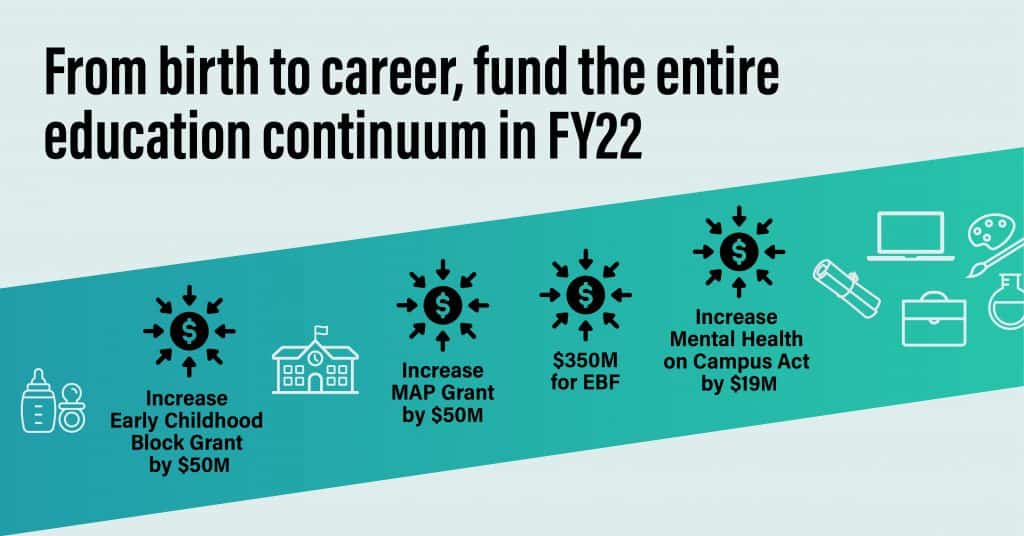
Just three months ago, we made the case that it would take new ways of thinking and working to ensure the state’s education system emerges from the pandemic able to serve kids better and more equitably. Policymakers must see education in Illinois as a single, interconnected system from birth to career that provides equitably and adequately for our students at every stage. And to create this improved system, funding and policies must extend beyond the traditional silos of early childhood, K-12, and higher education.
We’re happy to report signs of positive progress. In March, President Joe Biden signed into law the American Rescue Plan, a sweeping $1.9 trillion stimulus package aimed to help families struggling with the impact of the COVID-19 pandemic. The legislation includes historic one-time investments in child care, home visiting, Early Intervention, K-12 education, special education, Early Head Start, Head Start, and higher education. These federal funds represent a lifeline for the children and families of Illinois.
While the federal government has provided important short-term funding as a stopgap to help weather the current storm, the state has a critical role to play to ensure the health and sustainability of our education system.
It is why we were thrilled to see the recent announcement from Governor Pritzker indicating he supports appropriating an additional $350 million in state funds for the Evidence-Based Funding formula as part of the fiscal year 2022 (FY22) state budget. Putting $350 million of state dollars into the school formula will allow districts to make the long-term investments necessary to create strong, sustainable educational programs. An infusion of state funding will allow school leaders to use the federal relief dollars as intended: to safely reopen schools for in-person learning and support students socially, emotionally, and academically as they recover from the many ways in which COVID-19 has disrupted their development and learning.
As excited as we are to see the governor and leaders of the General Assembly back these investments publicly, the rest of our education system also needs their support. Increases in funding to schools must be paired with similar increases in funding to early childhood and post-secondary education.
We call on the General Assembly to increase appropriations for the Early Childhood Block Grant by $50 million, the Monetary Award Program by $50 million, and the Mental Health on Campus Act by $19 million.
Illinois has increased state investments in early childhood alongside those in the K-12 system, historically, because the state’s early care and education system plays such a critical role in the success of its future K-12 students. Current funding falls far short of what is needed to provide a fully-funded early learning system that supports communities, families, educators, and providers. Earlier this year, the recommendations from the Commission on Equitable Early Childhood Education and Care Funding estimated that the current level of state and federal investment in our state’s early childhood system is only about 14% of what is needed to provide high-quality services for all families. Fully funding the state’s early childhood system is a long-term project, but an investment of $50 million in the upcoming fiscal year would act as an important down payment, particularly if that investment is focused on reducing inequities in compensation for teachers working in community-based programs or with infants and toddlers.
As for post-secondary education, we know that disinvestment over the last few decades, particularly during difficult budget years, has forced institutions to more than double tuition and fees to stay open. Students from low-income households bear the brunt of this burden. While increasing MAP will help, it is not enough– we need long-term structural change to fund higher education. There is a bill making its way through the legislative process that would establish a Commission to make recommendations on how to fund higher education more equitably and adequately. This is a conversation worth having and we urge Springfield to act now.
The practice of supporting one part of the education continuum while freezing budgets in other parts is imprudent, as students cannot develop and thrive without a strong overall system that will see them through from birth to career. We’ve seen in 2021 that a lot can happen in a few short months when we work together to reimagine a better world for children and families. We encourage the Illinois General Assembly and the Pritzker Administration to keep the momentum going. Our children deserve nothing less.
Written in partnership with:
- Advance Illinois
- Illinois Action for Children
- Partnership for College Completion
- Stand for Children Illinois

